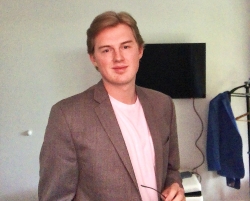Alexander Miller '20
c177927a-1f43-40fa-8ce8-b5b59c60eba4-0e083794-2b9c-4f9d-9a5b-05b39d376e77.jpg

Major: Economics
Minor: Religion
Hometown: Salt Lake City, UT
When Alexander Miller was researching colleges, energy wasn't necessarily at the forefront of his mind. In fact, it was Dartmouth's Religion Department that piqued his interest and convinced him that he had found the school for him. But, he recalls, "My essay when I was applying to Dartmouth answered the question 'what part of your life that's important to you isn't represented elsewhere in your application?' And I wrote all about how important energy systems and sustainability were to me. So the interest was always there."
After taking a few economics classes — a topic he had always found fascinating, Alex decided to be an econ major. One of the best aspects of Dartmouth, he says, is that no matter what your major, your professors are open to and encouraging of students embedding their own passions and interests into the work. Economics and energy are a natural fit — Alex is particularly interested in power purchase and project finance — but he thinks that "energy intersects with just about any question we're asking ourselves as a campus, a nation, as a world" and there's room to fold it in to almost any major.
Alex points to two experiences that shaped what would become his more explicit focus on energy issues. First, during his freshman winter term, he got involved with Divest Dartmouth, a campus group advocating for the College to cease investing in fossil fuel companies. "Divest has been a defining experience; it led me to make other decisions and join other things that have been part of my Dartmouth energy career." As a Divest member, Alex worked on crafting a referendum to amplify student voices in College decision making, and joined the College Investment Office's Advisory Committee on Investor Responsibility as a way of gaining more exposure to College decision-makers and representing a divestment perspective on using the endowment to effect change.
Then, after sophomore summer, he took a medical withdrawal. Returning home to Utah to work on restoring his health, he found a job working for a small utility-scale solar and wind developer in Utah. Looking back on the experience, Alex says, "Getting into energy was part of my healing process. I think I was redirecting my professional ambitions toward something I could be proud of and toward something that stimulates me intellectually and satisfies me ethically. Which is what I think renewable energy does."
As he looks toward the future as a Dartmouth graduate, Alex is hopeful. His job search has led him to connect with a range of Dartmouth alumni — including a number of Irving Institute Advisory Board members — to get advice and perspectives on an extremely challenging job market. And, more broadly, he sees signs of hope in terms of the widespread adoption of renewable energy and the low-carbon energy transition that is needed to avoid the worst impacts of climate change. For example, as part of his senior economics capstone project, he did a study on how financial markets respond when corporations announce that they have joined a voluntary environmental initiative. "What I found was that you could expect to get a one percent bump in your share price, just by announcing your participation. Which is so cool! I was so glad! . . . If investor decisions start to resemble environmental consciousness, we're in for some excellent growth!"